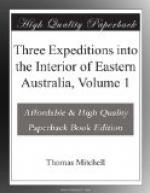Of the hills in general it may be observed that those on the left bank are most elevated at the higher parts of the river, whereas those on the right bank rise to greatest height towards the lower parts of the river, as far as explored by us. The plains extend on each side of the channel to a distance of six or seven miles and are in general clear of timber. That deep and extensive bed of clay, so uniformly filling the basin of this river, has every appearance of a mud deposit.
WOODS AND GRASSES.
Behind the plains the country is sparingly wooded except by the stunted bush (Myoporum montanum) which forms a thick scrub, especially on the side of the low hills. On the riverbank trees peculiar to it grow to so large a size that its course may be easily traced at great distances; and they thus facilitated our survey most materially. These gigantic trees consist of that species of eucalyptus called bluegum in the colony; and their searching roots seem to luxuriate in the banks of streams, lakes, or ponds, so that the thirsty traveller soon learns to recognise the shining trunk and white, gnarled arms, as the surest guides to water. The alluvial portion of the margin of the Darling is narrow, and in most places overgrown with the dwarf box, which is another species of eucalyptus. In it are hollow places as already observed, covered with the Polygonum junceum, which is an unsightly leafless bush or bramble. Grass is only to be found on the banks of the river and, strictly speaking, the margin only can be considered alluvial, for this being irrigated and enriched by the floods it is everywhere abundantly productive of grass, though none may appear in the back country.
GUM ACACIA ABUNDANT.
In the ground beyond the plains some casuarinae and eucalypti are occasionally seen in the scrubs which grow on the red sand, and an acacia with a white stem and spotted bark there grows to a considerable size, and produces much gum. Indeed gum acacia abounds in these scrubs, and when the country is more accessible may become an article of commerce.
GRASSES.
The plants were in general different from those nearer the colony, and though they were few in number, yet they were curious. Of grasses I gathered seeds of twenty-five different kinds, six of which grew only on the alluvial bank of the Darling. Among them were a poa, and the Chloris truncata, and Stipa setacea of Mr. Brown. The country was nevertheless almost bare, and the roots, stems, and seeds, the products of a former season, were blown about on the soft face of the parched and naked earth where the last spring seemed indeed to have produced no vegetation excepting a thin crop of an umbelliferous weed.




